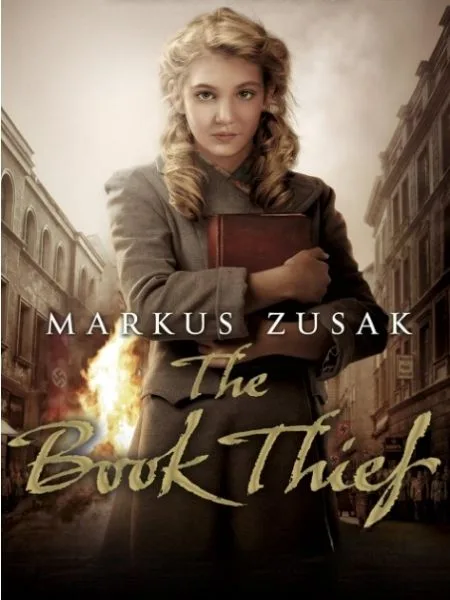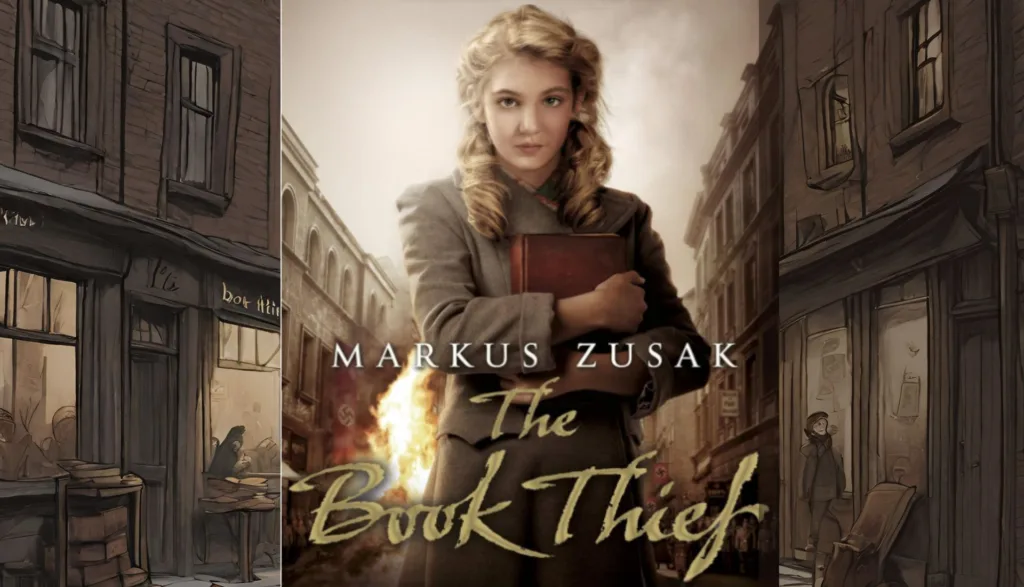Amidst the realm of literary creations, “The Book Thief,” masterfully crafted by Markus Zusak, stands as an unparalleled work that transcends the conventional boundaries of storytelling. Originating in the literary landscape in 2005, this opus of historical fiction unfolds against the ominous tapestry of Nazi Germany. Its narrative, narrated by Death itself, bestows a singular perspective on the intricate tapestry of the human experience. The work boasts a distinctive narrative style, an opulence of character intricacies, and an exploration of profound themes such as the potency inherent in words, the resilience of the human spirit, and the convoluted nature of humanity. The indelible impact of “The Book Thief” resonates globally, leaving an enduring impression on discerning readers.

"The Book Thief" story goes on:
The novel unfolds in Molching, a small German town, during the height of World War II. Liesel Meminger, the eponymous book thief, is sent to live with foster parents, Hans and Rosa Hubermann, after her mother is forced to part with her due to political reasons. Liesel is haunted by the death of her younger brother and the traumatic separation from her mother. However, it is through her experiences in Molching that the reader witnesses Liesel’s growth and resilience.
The narrative takes a captivating turn as Liesel steals her first book, “The Grave Digger’s Handbook,” during the funeral of her brother. This event marks the beginning of her love affair with words, as she learns to read and share her stolen treasures with those around her. Zusak masterfully weaves Liesel’s personal journey with the broader historical context, as the Hubermanns hide a Jewish fist-fighter, Max Vandenburg, in their basement.
Narrative Style:
One of the most striking aspects of “The Book Thief” is its narrative style. Death serves as the omniscient and unconventional narrator, providing a unique lens through which to view the events of the story. Death’s perspective offers a detached yet compassionate commentary on the characters and their fates. This unusual choice of narrator not only adds an extra layer of depth to the narrative but also emphasizes the inevitability of mortality, creating a haunting atmosphere throughout the novel.
Zusak’s prose is poetic and evocative, painting vivid images with his words. The narrative is interspersed with short anecdotes and reflections, creating a tapestry of interconnected stories that ultimately converge into Liesel’s tale. This fragmented storytelling mirrors the disjointed nature of human experiences during times of war and serves as a powerful tool for conveying the emotional weight of the story.
Themes:
“The Book Thief” delves into a myriad of themes that resonate deeply with readers. One prominent theme is the power of words. Liesel’s fascination with books becomes a coping mechanism and a source of solace in the midst of the chaos. Through Liesel’s journey, Zusak emphasizes how words can be both destructive and redemptive, showcasing the dual nature of language.
The novel also explores the resilience of the human spirit. Liesel’s ability to find hope and joy in the darkest of times is a testament to the indomitable nature of the human soul. The characters in the story face unimaginable challenges, yet they exhibit strength, courage, and a determination to persevere.
Additionally, the narrative sheds light on the moral complexities of human nature. Characters like Hans Hubermann challenge traditional notions of heroism by displaying kindness and compassion in a society tainted by hatred. Conversely, characters like Liesel’s classmate, Rudy Steiner, embody innocence and purity, highlighting the contrasting shades of humanity.
Character:
Zusak’s character development is a triumph in “The Book Thief.” Liesel’s transformation from a traumatised young girl to a resilient and compassionate individual is at the heart of the novel. The relationships she forms with those around her, especially with Hans Hubermann and Max Vandenburg, showcase the transformative power of human connections.
Hans Hubermann, Liesel’s foster father, emerges as a central figure in the narrative. His nurturing and fatherly love provide Liesel with a sense of security and support. Hans defies the prevailing ideology of Nazi Germany by displaying empathy and humanity, making him a symbol of resistance against the dehumanizing forces of war.
Max Vandenburg’s character is another poignant element of the story. As a Jewish refugee hiding in the Hubermanns’ basement, Max’s friendship with Liesel transcends religious and societal boundaries. Their shared love for words and literature becomes a source of strength for both characters, illustrating the unifying power of art even in the face of adversity.
The novel is set against the backdrop of Nazi Germany, offering a lens into the everyday lives of ordinary people during a tumultuous period. Zusak meticulously captures the atmosphere of fear, propaganda, and persecution that permeated society. The Hubermanns’ decision to hide Max Vandenburg reflects the acts of resistance undertaken by individuals who dared to defy the oppressive regime.
“The Book Thief” also explores the impact of propaganda on young minds, as Liesel and her classmates are subjected to indoctrination through Hitler Youth. Zusak confronts the destructive power of ideology and the importance of critical thinking in the face of systemic manipulation.
Since its publication, “The Book Thief” has garnered widespread acclaim and has become a contemporary classic. Readers and critics alike praise Zusak’s narrative innovation, emotional depth, and profound exploration of humanity. The novel has been translated into numerous languages, reaching a global audience and leaving an enduring mark on the literary landscape.
Adaptation:
The film adaptation of “The Book Thief,” released in 2013, brought the story to the big screen, introducing it to an even broader audience. While adaptations often face challenges in capturing the essence of a novel, the film received positive reviews for its faithful portrayal of the source material and the performances of the cast.
“The Book Thief” stands as a testament to the enduring power of literature to illuminate the human experience. Markus Zusak’s narrative ingenuity, coupled with the exploration of profound themes and memorable characters, has solidified the novel’s place in the literary canon. Through the eyes of Death, readers are invited to witness the resilience of the human spirit, the transformative nature of words, and the capacity for kindness in the darkest of times. “The Book Thief” remains a poignant and unforgettable journey into the heart of humanity.

